Key takeaways:
- Personal experiences and storytelling significantly enhance environmental awareness and motivate change in habits.
- Adopting eco-friendly practices, like biodegradable products and water recycling, can greatly reduce environmental impacts in the car wash industry.
- Community engagement and collaboration with local businesses have led to increased awareness and advocacy for sustainable practices.
- Successful advocacy can inspire systemic change, leading to citywide initiatives and policies that promote environmental responsibility.
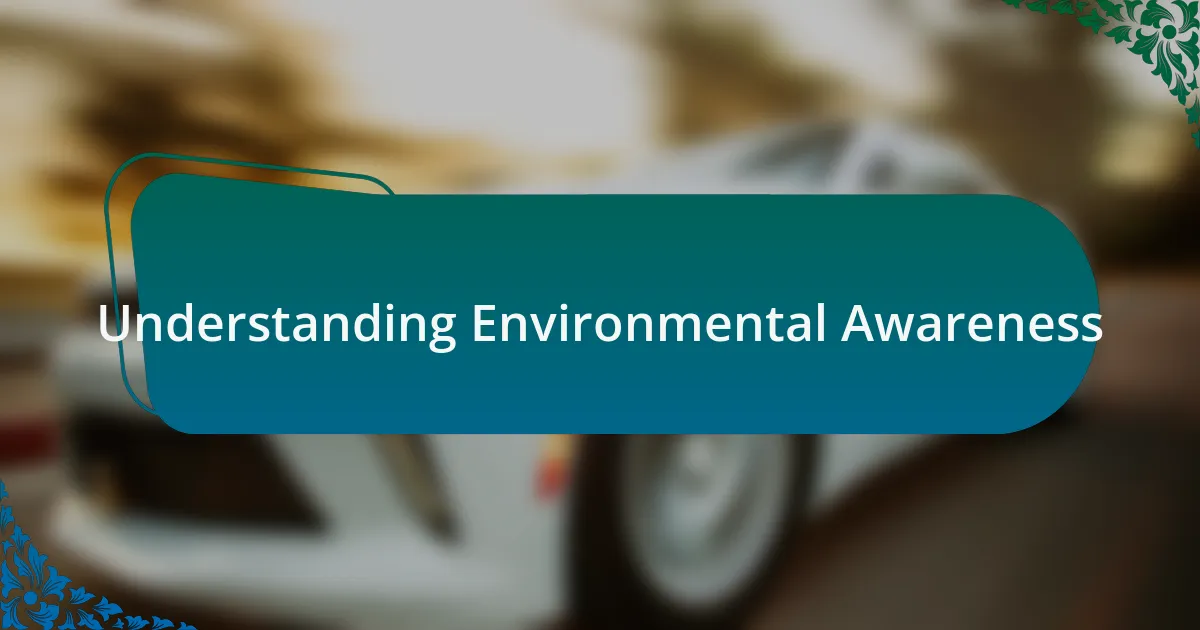
Understanding Environmental Awareness
Understanding environmental awareness requires more than just knowing about pollution or climate change; it involves recognizing our interconnectedness with nature. I remember the first time I stood on a beach littered with plastic. It wasn’t just trash; it was a stark reminder of how our choices directly impact the world around us—how even small actions contribute to larger environmental problems.
When I started advocating for environmental awareness, I often asked myself: what motivates people to change their habits? I found that sharing personal stories about how pollution affected my local area made a significant difference. It sparked conversations, making it easier for others to empathize and understand the urgency of our environmental crisis.
It’s essential to cultivate a mindset that sees the beauty in the planet and the importance of preserving it. I sometimes encourage friends to join me on nature hikes. When they connect with the environment on that personal level, they begin to realize that protecting our world is not just a responsibility but also a privilege. How can we expect others to care, if we don’t share our own passion and experiences?
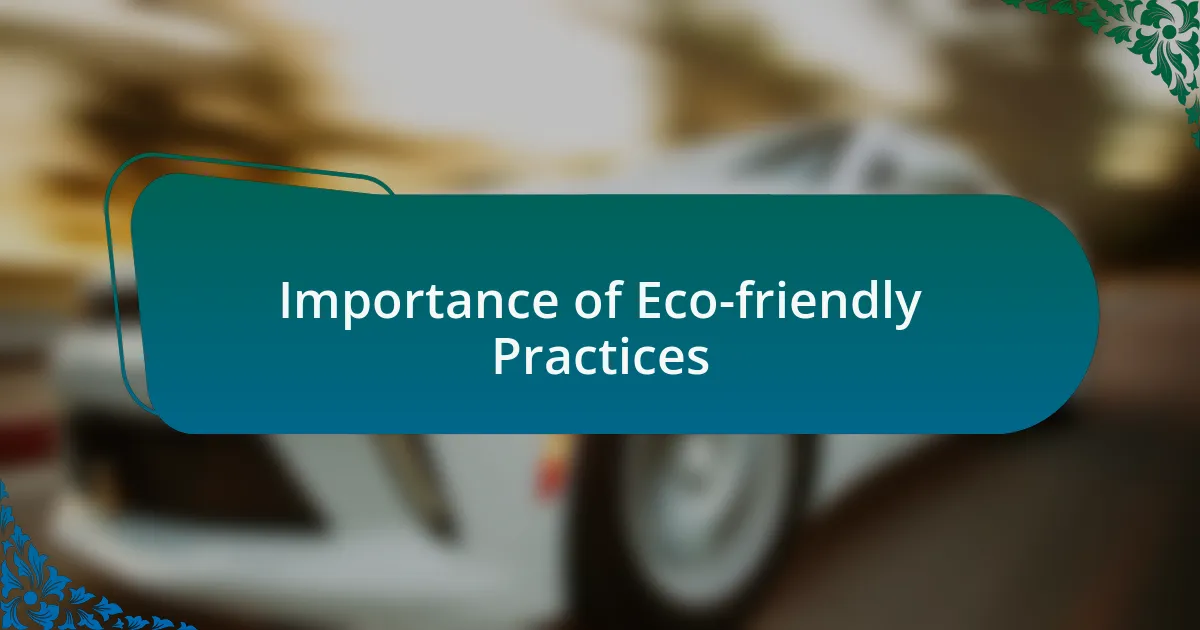
Importance of Eco-friendly Practices
The significance of eco-friendly practices cannot be overstated. I distinctly recall when I switched to biodegradable car wash products; it felt like a small step, but the impact was immense. Knowing that I was reducing harmful chemicals from entering our waterways brought a sense of pride and responsibility.
Implementing such practices can lead to substantial environmental benefits. For example, I remember volunteering at a local clean-up initiative, where we discussed how choosing eco-friendly products helps protect wildlife. It’s astounding to consider that every individual choice adds up, creating a larger positive footprint if we all commit to being more responsible.
Have you ever thought about how interconnected our daily habits are with the health of the planet? When I introduce the idea of using waterless car wash solutions to friends, it sparks curiosity and often leads to deeper discussions about sustainability. Such interactions highlight how embracing eco-friendly practices can inspire a broader, collective movement toward environmental consciousness.
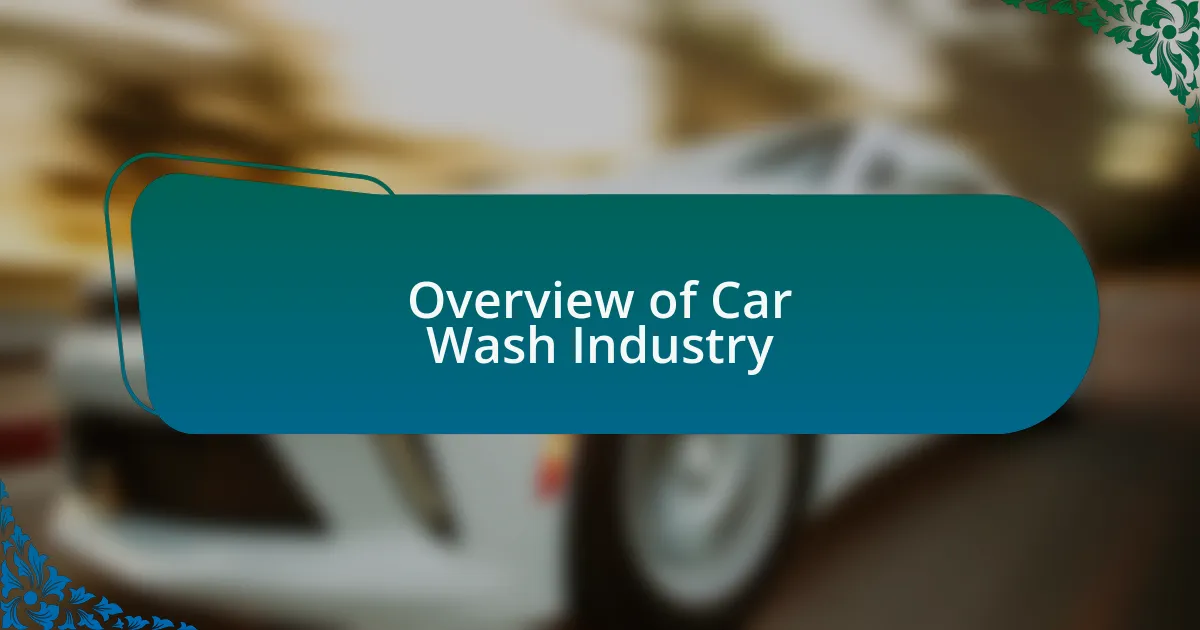
Overview of Car Wash Industry
The car wash industry has evolved significantly, reflecting trends in consumer preferences and environmental awareness. I remember visiting a local car wash that had recently transitioned to using reclaimed water for their cleaning process. It was refreshing to see how they incorporated sustainable practices into their day-to-day operations, making me ponder how many such facilities prioritize eco-friendliness.
Interestingly, the market for car washes has grown considerably, with more consumers seeking services that align with their values. I often find myself engaging in conversations with fellow car enthusiasts about the importance of car wash choices. It’s intriguing to realize that many of us now look for options that not only clean our vehicles but also safeguard the environment.
As the industry expands, it’s clear that awareness of environmental impact has become a crucial factor for many consumers. I’ve often thought about how our choices at the car wash can ripple outward—what if everyone prioritized eco-conscious services? It’s this potential for systemic change that makes our advocacy for environmental awareness in the car wash industry feel not just necessary but possible.
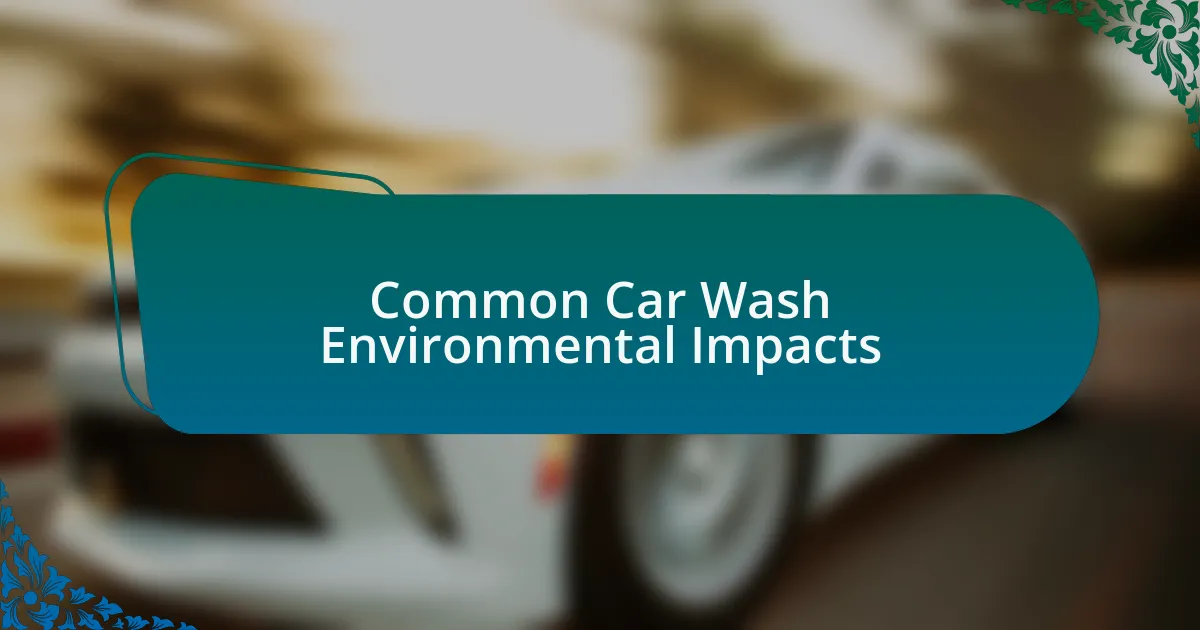
Common Car Wash Environmental Impacts
When it comes to common environmental impacts, one of the most significant issues I’ve witnessed is water pollution. Many traditional car wash facilities use harsh chemicals that, when washed away, end up in local waterways. I recall a particularly eye-opening experience when I visited a wash near a river, and I couldn’t help but wonder how many of those cleaning agents were seeping into the ecosystem. It made me realize that our car wash habits can directly affect the health of our environment.
Additionally, the sheer volume of water consumed in car washing is staggering. I’ll never forget the day I stood by a self-service station, watching customers rinse their vehicles, completely unaware that they could be using upwards of 100 gallons of water. This left me thinking—what if we all took a moment to consider more sustainable alternatives? A simple shift towards water-efficient washes could significantly reduce this waste.
Finally, let’s not forget the impact of runoff. As rain hits that freshly cleaned surface, all those chemicals and detergents can create a toxic cocktail that flows into storm drains. This reality hit home for me during a neighborhood cleanup event; we found nearby wildlife affected by pollutants stemming from car washes. It made me question—how can we advocate for change if we don’t first recognize these consequences?
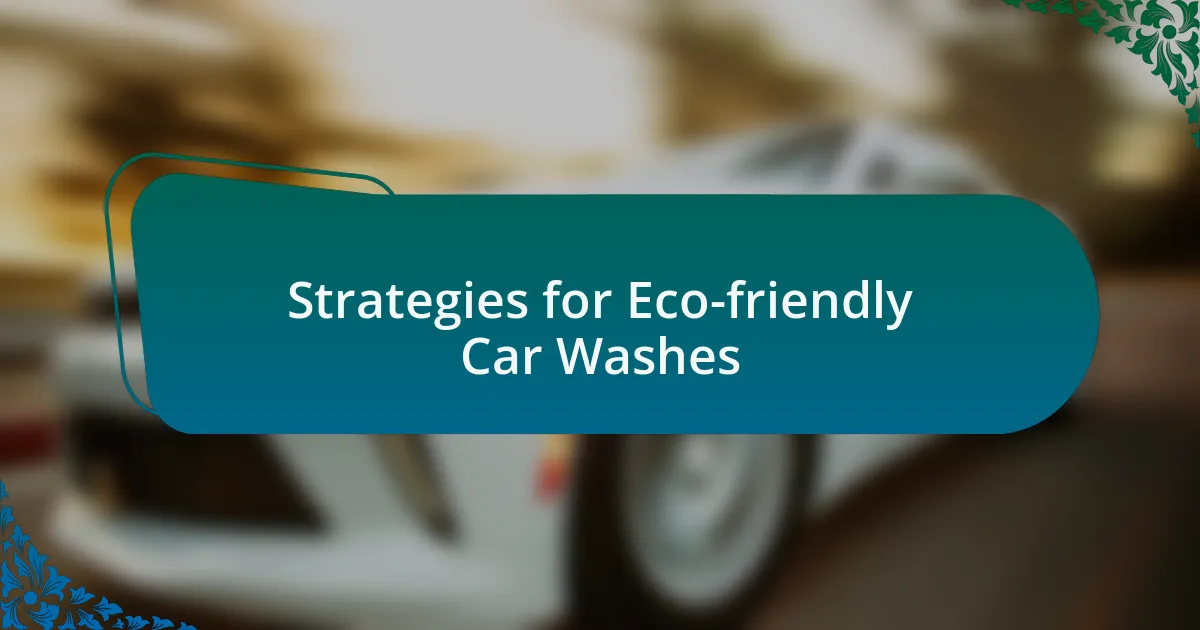
Strategies for Eco-friendly Car Washes
One effective strategy I’ve found for promoting eco-friendly car washes is the use of biodegradable cleaning products. I remember the first time I tried a wash that emphasized natural ingredients instead of harsh chemicals; it felt good to know that my car could shine without harming the environment. Wouldn’t it be great if more facilities made this switch?
Adopting water recycling systems also stands out as a transformative approach. When I visited a car wash with an advanced filtration setup, I was impressed to learn they could reuse up to 80% of the water from each wash. Seeing this in action not only reduced the facility’s overall water consumption but also sparked my curiosity about how other businesses could implement similar technologies to make a difference.
Another impactful tactic is the promotion of waterless car wash solutions. I was skeptical at first, recalling my childhood experiences with soapy buckets and hoses, but I gave it a try. What surprised me was how effective waterless products can be, along with their environmental benefits—suddenly, the idea of washing my car without contributing to water waste became more appealing. Have you considered the potential of going waterless? It could be a game-changer for eco-conscious consumers.

My Personal Advocacy Journey
I remember my first foray into environmental advocacy during a community meeting focused on local pollution issues. It was a small gathering, but I felt a surge of determination when I saw so many passionate individuals eager to make a difference. I shared my vision of promoting eco-friendly car washes as a way to not only clean our vehicles but also to protect our shared environment, realizing then how interconnected our choices truly are.
As I dove deeper into this journey, I began volunteering at local events aimed at raising awareness about sustainable practices. One memorable day, we organized a clean-up event at a nearby river, where I realized the direct impact that dirty run-off from car washes can have on our waterways. The sight of volunteers picking up trash while discussing the importance of eco-friendly washing methods was a powerful reminder that each small action counts in this larger effort.
Engaging with local businesses has been another pivotal part of my advocacy. I remember meeting a car wash owner who was initially resistant to change. However, after sharing studies on the environmental impacts and offering to help implement green practices, he became an enthusiastic partner. Building these relationships not only strengthened our community but also emphasized how collaboration can lead to meaningful change. What do you think—could the right partnerships make a significant difference in promoting sustainability in every neighborhood?
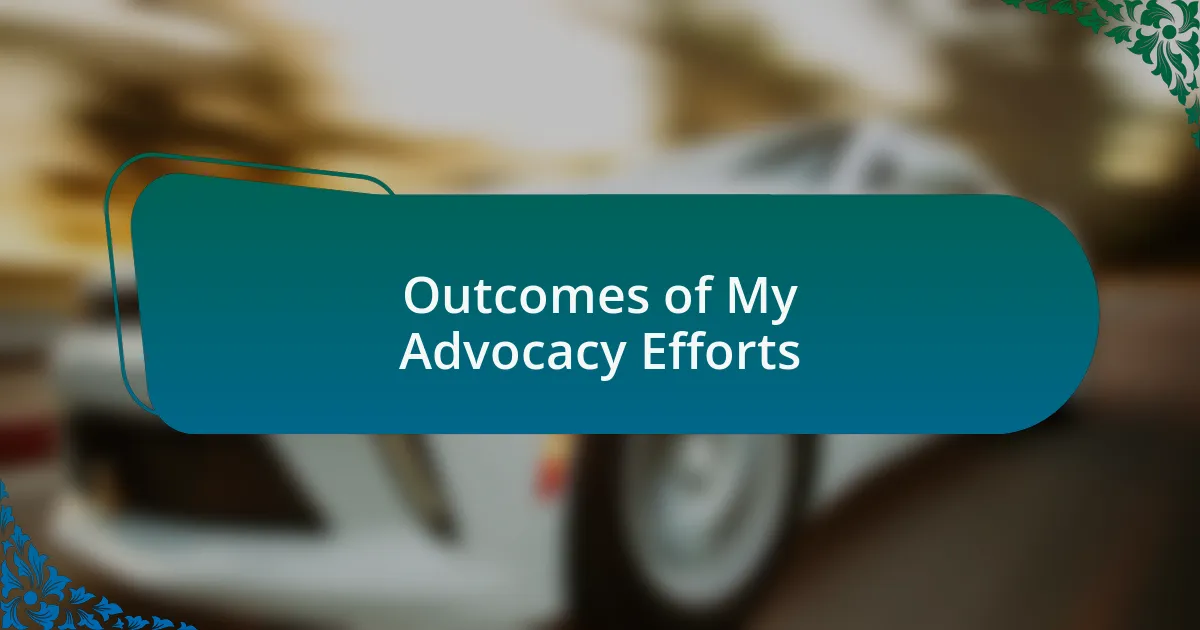
Outcomes of My Advocacy Efforts
The outcomes of my advocacy efforts have been incredibly rewarding. One significant achievement was the transformation of that once reluctant car wash owner into a staunch advocate for eco-friendly practices. Witnessing his shop rebrand with sustainable methods not only boosted his business but also inspired neighboring businesses to reevaluate their own practices. Isn’t it fascinating how one change can ignite a ripple effect?
Through community workshops, I noticed a remarkable increase in public interest around water conservation. At our first event, only a handful of participants engaged in discussions about eco-friendly car washing. Fast forward to our latest workshop, and we had standing room only! I felt a sense of pride as local residents shared their stories of implementing sustainable washing habits—proof that education can truly empower individuals to make conscientious choices.
In response to increased awareness, a local initiative emerged to promote eco-friendly car wash practices citywide. I was thrilled when the city recognized the importance of reducing water waste and adopted regulations encouraging more sustainable washing options. Seeing our collective efforts blossom into formal policies was not just a personal victory; it felt like our community had truly come together to embrace a greener future. How incredible is it to witness advocacy translate into actual change?